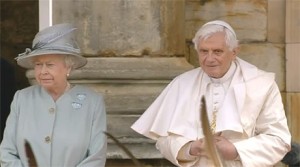 No, of course not, but Republicans hoping for a GOP win in Delaware do now have to deal with this:
No, of course not, but Republicans hoping for a GOP win in Delaware do now have to deal with this:
O’DONNELL: I dabbled into witchcraft — I never joined a coven. But I did, I did. … I dabbled into witchcraft. I hung around people who were doing these things. I’m not making this stuff up. I know what they told me they do. […] One of my first dates with a witch was on a satanic altar, and I didn’t know it. I mean, there’s little blood there and stuff like that. … We went to a movie and then had a midnight picnic on a satanic altar.
I suppose this could be the moment to post something terribly, terribly brows-furrowed about the rather interesting role that witchcraft and Satanism play in the modern American evangelical drama (small ‘e’ in O’Donnell’s case: she was certainly raised a Roman Catholic, and then I believe became an evangelical before eventually returning to Catholicism), but that is to make more out of this particular ‘confession’ than it (or her Democratic opponent) deserves.
I suspect that Ann Althouse’s response is (more or less) the correct one to take:
…Did O’Donnell ever practice witchcraft? I doubt it. Even in the out-of-context clip, I’m seeing a young woman trying to get the hipper kids to believe she isn’t really a complete square. In the story she tells, she went out with someone who, she thought, was into Satanism, and they had a picnic. A picnic! Even when she’s straining to sound cool, she’s square.
4. But she “dabbled into” witchcraft — doesn’t that mean she did some witchcraft things? Frankly, I don’t think she knows what “dabbled” means. The use of the wrong preposition is a hint. I think she means something more like she stumbled into witchcraft. She knew some people who did such things, and I’ll bet the point she was making was that she was able to be friends with them, that she hasn’t spent her whole life cocooned in squeaky clean conservative religion and she’s able to relate to a wide variety of people.
5. Even if she had participated in some witchcraft, she’d only be like thousands of other young people who dabble in such nonsense. Do you want to string them all up? It’s typical pop culture junk these days.
I wouldn’t be quite as quick as Professor Althouse to dismiss witchcraft as “typical pop culture junk”. It can be that, and it’s certainly nonsense, but the revival of interest in Wicca (and the like) is too interesting a phenomenon to be dismissed as just a mere fad. But so far as O’Donnell’s apparent “dabbling” in witchcraft is concerned, the good professor is right, move on, there’s nothing to see here.




 One reason that Delaware’s best-known GOP candidate will have such a mountain to climb in the general election is the emergence of fresh embarrassments like these comments (
One reason that Delaware’s best-known GOP candidate will have such a mountain to climb in the general election is the emergence of fresh embarrassments like these comments (